Drowning in Paperwork? 8 Software Solutions to the Rescue
Tired of chasing documents? Efficient document collection is crucial for any business. This article presents 8 top document collection software solutions for 2025, ranging from simple to robust, to help streamline your workflows. Discover how tools like Superdocu, Adobe Acrobat Pro DC, Microsoft SharePoint, Evernote Business, Box, Mendeley, Dropbox Business, and DocuWare can simplify your document management, saving you time and boosting productivity. Learn which document collection software best suits your needs and budget.
Table of Contents
1. Superdocu
Superdocu is a powerful cloud-based document collection software solution that streamlines and automates the often tedious process of gathering documents from clients, employees, or other stakeholders. This platform is particularly well-suited for small to medium-sized businesses (SMBs) and specialized industries like legal, real estate, HR, immigration, and transportation, offering tailored solutions to their unique document management needs. Imagine effortlessly collecting everything from client onboarding paperwork and employee tax forms to property leases and driver licenses – all within a secure and organized digital environment. Superdocu simplifies this complex process by providing easy-to-use builders, pre-built industry templates, and fully customizable branded portals. This allows businesses to maintain a professional image while collecting sensitive information efficiently.
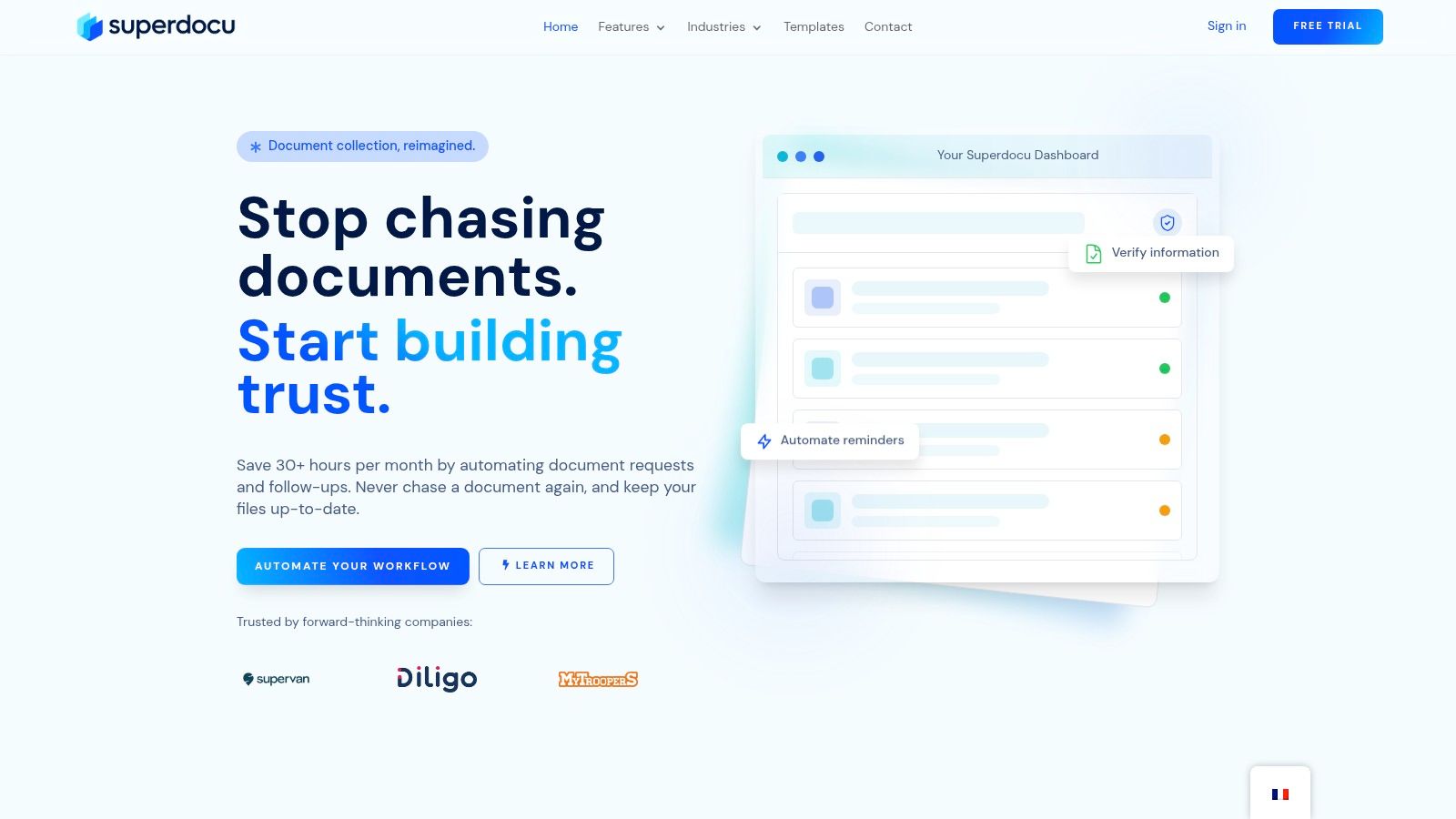
With Superdocu, you can create tailored request links, automate reminders, and collect documents securely from any device. This accessibility not only simplifies the process for your team but also improves the client experience by enabling them to submit documents at their convenience. The platform prioritizes security and compliance with robust features such as encryption, GDPR adherence, and European hosting, ensuring that sensitive data remains protected. A centralized validation dashboard further empowers teams to efficiently review, approve, or reject submitted documents, maintaining control and accuracy throughout the process. Furthermore, automated expiration tracking ensures that documents are kept up-to-date, reducing the risk of using outdated information.
Learn more about Superdocu and their specific industry solutions.
For businesses already using other software solutions, Superdocu’s integrations with Zapier and DocuSign offer unparalleled flexibility. Connecting with over 3,000 apps through Zapier allows for seamless automation of workflows, while DocuSign integration enables eSignature steps directly within the document collection process. This comprehensive integration capability positions Superdocu as a central hub for document management.
Pros:
- Intuitive workflow builder with customizable and repeatable processes tailored to multiple industries.
- Robust security features including encryption, GDPR compliance, and EU-based hosting to safeguard sensitive data.
- Seamless integrations with Zapier (3,000+ apps) and DocuSign eSignature to automate workflows end-to-end.
- Automated reminders and expiration tracking to keep document collection and validation continuously up-to-date.
- Branded portals and invitation emails that enhance client experience and reinforce corporate identity.
Cons:
- Pricing may be on the higher side for very small businesses or sole proprietors with limited document volume.
- Advanced integrations and features like API access and custom storage are only available on Enterprise plans, requiring direct consultation.
Superdocu offers a transparent pricing model with Starter, Pro, and custom Enterprise plans, along with a 7-day free trial. While specific pricing details may require contacting sales, this tiered structure allows businesses to select a plan that best suits their needs and budget. Its robust features and industry-specific focus make Superdocu a worthy contender for businesses looking to transform tedious document chasing into a smooth, secure, and efficient experience, ultimately boosting productivity and client satisfaction.
2. Adobe Acrobat Pro DC
Adobe Acrobat Pro DC is a powerful document collection software solution ideal for businesses of all sizes needing robust PDF creation, editing, and management capabilities. While known as the industry standard for PDF manipulation, its comprehensive feature set makes it a top contender for efficient document collection as well. Whether you’re a small business streamlining workflows, a legal firm ensuring compliance, or an HR department managing onboarding documents, Acrobat Pro DC offers tools to simplify complex processes.
This software excels at collecting and combining various file types – Word documents, spreadsheets, images, and even scanned papers – into a single, organized PDF. This is crucial for businesses like real estate agencies handling property documents and tenant applications, mortgage brokers managing loan paperwork, or immigration firms processing visa applications. Imagine compiling all necessary client documentation into a single, searchable PDF, drastically reducing clutter and improving accessibility. This capability alone justifies its place on this list of top document collection software.
Acrobat Pro DC’s integrated Optical Character Recognition (OCR) technology further enhances its document collection capabilities. OCR converts scanned documents and images into searchable and editable text, making information retrieval effortless. For example, transportation companies can use this feature to digitize driver logs and vehicle documentation, making compliance audits a breeze. Similarly, HR and staffing agencies can leverage OCR to quickly process resumes and application forms, saving valuable time and resources.
Key Features and Benefits:
- PDF Creation and Editing: Create PDFs from scratch or convert existing files. Advanced editing tools allow for formatting adjustments, adding annotations, and inserting multimedia.
- Document Collection and Combination: Merge multiple file formats into a single, cohesive PDF. Organize pages, apply consistent formatting, and create bookmarks for easy navigation.
- OCR Technology: Transform scanned documents into searchable and editable PDFs, simplifying information retrieval and document management.
- Electronic Signatures: Securely collect legally binding electronic signatures, streamlining approvals and contract management. This is invaluable for legal firms, real estate agencies, and financial services professionals.
- Cloud Storage Integration: Seamlessly integrate with Adobe Document Cloud for convenient access, sharing, and collaboration across devices.
Pros:
- Industry-Standard PDF Tools: Benefit from the most comprehensive PDF editing and manipulation capabilities available.
- Excellent Adobe Integration: Works seamlessly with other Adobe Creative Cloud applications.
- Advanced Security Features: Protect sensitive information with password protection, redaction, and certificate-based signatures.
- Robust Mobile App Support: Access and manage documents on the go.
Cons:
- Higher Price Point: Acrobat Pro DC comes at a premium compared to some competitors. However, the extensive features and robust functionality often justify the cost for professional use.
- Steeper Learning Curve: Mastering all of Acrobat Pro’s features can take time. However, ample tutorials and resources are available online.
- Resource-Intensive: Can be demanding on system resources, potentially slowing down less powerful computers.
Pricing: Subscription-based pricing is available. Check the Adobe Acrobat website for current pricing plans.
Technical Requirements: System requirements vary depending on the operating system. Refer to the Adobe website for detailed specifications.
Implementation Tip: Start by utilizing the core document collection and OCR features. Gradually explore advanced editing tools and security features as needed. Consider online tutorials and training resources to maximize your proficiency.
By investing in Adobe Acrobat Pro DC, businesses gain a powerful tool for streamlining document collection, enhancing collaboration, and improving overall productivity. While the price point may be higher than some competitors, the extensive features and integration with the Adobe ecosystem make it a valuable asset for organizations prioritizing professional-grade document management.
3. Microsoft SharePoint
Microsoft SharePoint is a powerful document collection software solution that integrates seamlessly with the Microsoft Office suite. It serves as a centralized platform for document management and storage, enabling organizations to create secure, password-protected workspaces for efficient document sharing and collaboration. SharePoint’s robust features include version control, metadata tagging, and advanced search capabilities, making it a valuable tool for businesses of all sizes looking to streamline their document workflows. This platform offers flexibility in deployment, allowing organizations to choose between on-premises installation or cloud-based access through Microsoft 365. For businesses already heavily reliant on the Microsoft ecosystem, SharePoint offers a natural extension for document collection and management.
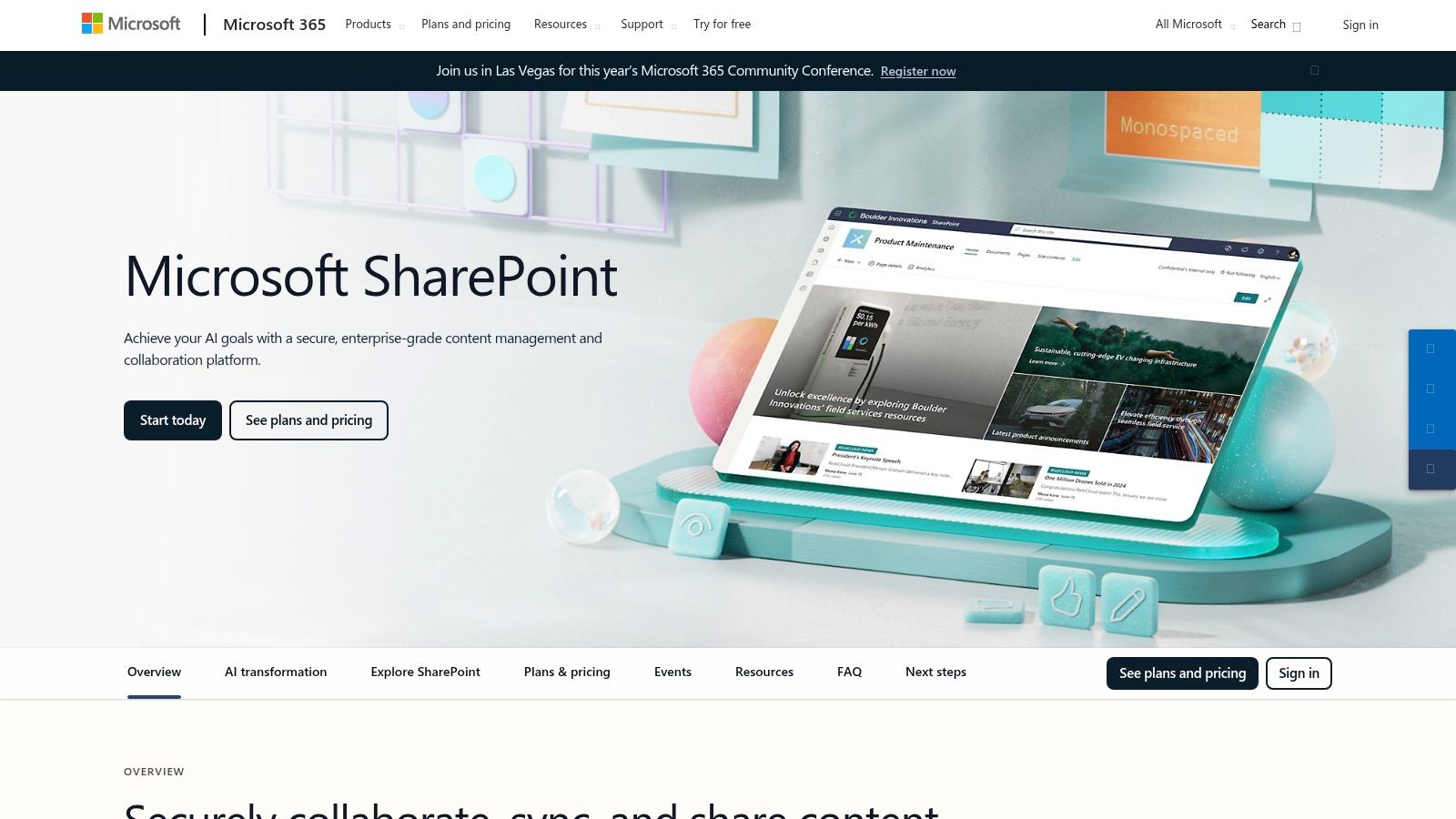
SharePoint excels in various document collection use cases. Legal firms can leverage its robust security and compliance features for secure client document management. HR and staffing agencies can streamline candidate onboarding and verification processes. Real estate agencies benefit from efficient property document and tenant application processing. Mortgage brokers and financial services professionals can automate loan paperwork. Transportation companies can utilize SharePoint for driver/vehicle document collection and onboarding. Even immigration firms and portfolio managers can find value in its organized data management capabilities. For example, a mortgage broker can create automated workflows to manage the flow of loan applications, ensuring all necessary documents are collected, reviewed, and approved efficiently. Similarly, a legal firm can create a secure, centralized repository for case files, enabling authorized personnel to access and collaborate on documents from anywhere.
Features:
- Centralized document repository with hierarchical organization: Easily organize and manage documents in a structured manner.
- Version control and document check-in/check-out functionality: Track changes and prevent accidental overwrites.
- Collaborative editing and real-time co-authoring: Work on documents simultaneously with colleagues.
- Custom metadata and tagging for advanced document organization: Improve searchability and retrieval of specific documents.
- Automated workflows for document approval and processing: Streamline document-centric business processes.
Pros:
- Deep integration with Microsoft Office suite: Seamlessly work with familiar applications like Word, Excel, and PowerPoint.
- Highly customizable with extensive third-party add-ons: Tailor SharePoint to your specific business needs.
- Robust security and compliance features: Protect sensitive information with advanced security measures.
- Scales well for enterprise-level document management needs: Adapts to growing document volumes and user demands.
Cons:
- Complex implementation and administration: Requires technical expertise for initial setup and ongoing maintenance.
- Can be overwhelming for small organizations: The extensive feature set might be excessive for businesses with simpler document management needs.
- May require significant customization to meet specific business needs: Out-of-the-box functionality might not address all requirements.
- Higher costs for advanced features and storage: Additional fees may apply for premium functionalities and increased storage capacity.
While pricing depends on the specific Microsoft 365 plan selected, generally, options range from basic plans suitable for small businesses to enterprise-level subscriptions with advanced features and greater storage. Technical requirements vary depending on the deployment method (on-premises or cloud-based) and integration needs.
Compared to simpler document collection software, SharePoint offers more comprehensive functionality, but at the cost of increased complexity. For organizations seeking a robust, scalable, and highly customizable document management platform, SharePoint offers a powerful solution. For smaller organizations with simpler needs, however, less complex alternatives might be more suitable. Learn more about Microsoft SharePoint for more insights into its capabilities. Consider carefully whether SharePoint’s robust features justify its complexity and cost relative to your specific document collection software requirements. Implementation tip: Start with a pilot project focusing on a specific department or business process to gain experience and refine your SharePoint configuration before a full-scale rollout.
4. Evernote Business
Evernote Business stands out as a versatile document collection software solution, particularly well-suited for teams needing to centralize and share information. It goes beyond simple note-taking, allowing users to capture a wide range of content, from web clippings and PDFs to images and audio recordings. This makes it a powerful tool for various document collection needs, including research, project management, and knowledge sharing. For example, a marketing team could use Evernote Business to collect competitor research, articles, and design inspiration all in one place, facilitating seamless collaboration and informed decision-making. Similarly, legal teams can leverage it for secure client document management, ensuring compliance and easy access to critical files.
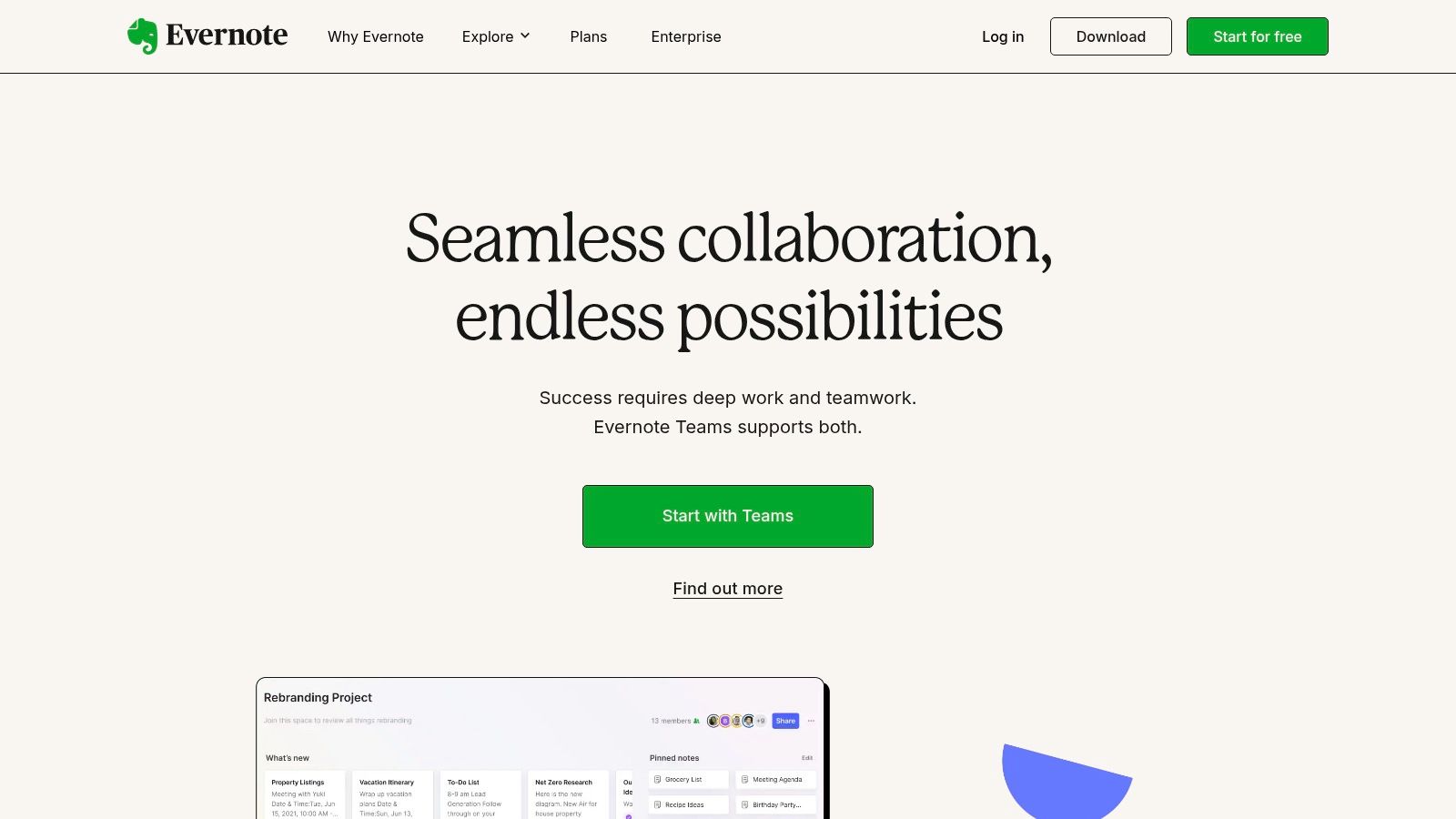
Evernote Business’s robust search functionality is a major advantage for efficient document retrieval. Optical character recognition (OCR) allows you to search for text within images and handwritten notes, saving you time and effort when locating specific information within your document collection. This feature proves invaluable for businesses dealing with large volumes of scanned documents or handwritten notes, such as legal firms or mortgage brokers. The cross-platform synchronization ensures access to your documents from any device, promoting flexibility and productivity on the go. Features like notebook sharing and collaborative spaces enhance team communication and streamline workflows, making it easier for teams to work together on projects and share knowledge. This is especially beneficial for distributed teams or businesses with remote employees.
While Evernote Business excels at collecting and organizing various information types, it’s essential to be aware of its limitations. Its document editing capabilities are less comprehensive than dedicated document editors like Microsoft Word or Google Docs. Users looking for advanced formatting or collaborative editing features might find this aspect limiting. Storage limitations on lower-tier plans could be a constraint for businesses dealing with extensive document collections. Consider your storage needs carefully when selecting a plan. Finally, while Evernote Business offers version history, it’s not as robust as specialized document management systems. If detailed version control and audit trails are critical for your business, exploring dedicated document management software might be more appropriate.
Key Features:
- Cross-platform Synchronization: Access your documents from any device.
- Web Clipper: Save online content directly to your Evernote account.
- Optical Character Recognition (OCR): Search text within images and handwritten notes.
- Notebook Sharing and Collaborative Spaces: Facilitate team collaboration.
- Tags and Custom Organization Systems: Organize your documents effectively.
Pros:
- Intuitive interface requiring minimal training.
- Excellent for collecting and organizing diverse information types.
- Powerful search capabilities across all content types.
- Good mobile experience with offline access.
Cons:
- Limited document editing capabilities.
- Storage limitations on lower-tier plans.
- Less robust version control than specialized systems.
Website: https://evernote.com/business
Evernote Business earns its place on this list because of its flexibility, powerful search, and collaborative features, making it a valuable document collection software solution for a variety of businesses. From legal firms requiring secure client document management to real estate agencies handling property documents, Evernote Business provides a centralized platform for organizing and accessing critical information. While it may not replace dedicated document editors or robust document management systems for specific use cases, its versatility and ease of use make it an excellent choice for many document collection needs. Consider your specific requirements and explore the different pricing plans to determine if Evernote Business is the right fit for your organization.
5. Box
Box stands out as a robust document collection software solution, particularly suited for businesses prioritizing security and streamlined workflows. It offers a centralized platform in the cloud for securely storing, managing, and collaborating on various types of documents. This makes it a strong contender for organizations needing to efficiently collect, process, and archive important files. Whether you’re a small business owner, legal professional, or part of a larger enterprise, Box can simplify document management.
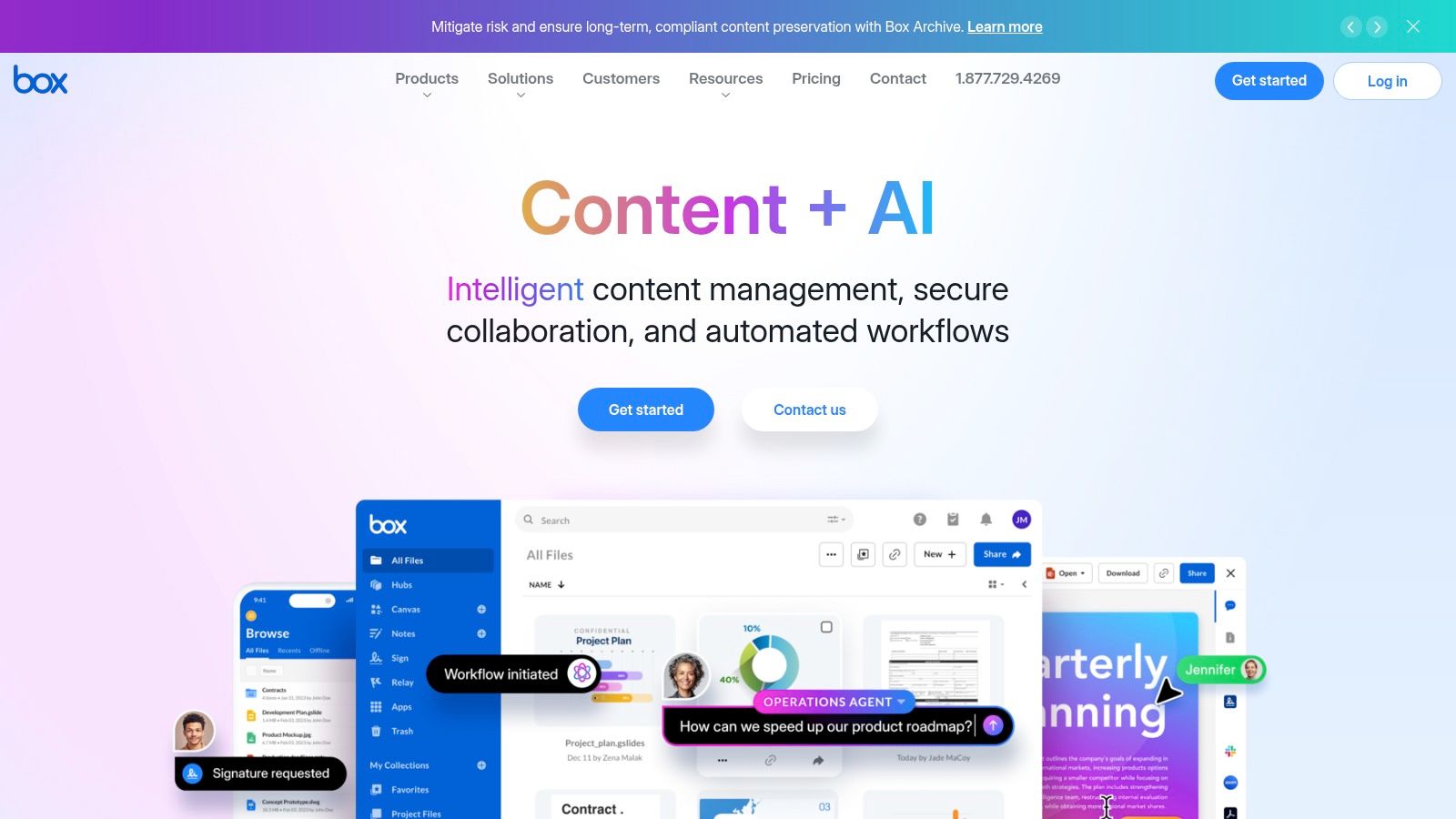
Consider these practical applications: legal firms can securely manage client documents and ensure compliance; HR departments can streamline onboarding with automated workflows for collecting employee paperwork; real estate agencies can efficiently process property documents and tenant applications; and mortgage brokers can automate loan paperwork. Transportation companies can benefit from streamlined driver and vehicle document collection, while immigration firms can easily manage visa application data. Even portfolio managers can leverage Box to organize critical investment documents.
Box’s features are tailored to optimize document collection: secure cloud storage with granular permission controls ensures data protection and confidentiality. Version history and document locking prevent accidental overwrites and maintain a clear audit trail. Advanced search with metadata filtering enables quick retrieval of specific files, even within large repositories. Box Notes facilitates collaborative document creation, while Box Relay automates workflows, reducing manual tasks and improving efficiency.
Key Features and Benefits:
- Secure Collaboration: Securely share files internally and externally with granular control over access permissions.
- Automated Workflows: Streamline document-centric processes like approvals and reviews using Box Relay.
- Centralized Repository: Consolidate all your essential documents in one secure location accessible from anywhere.
- Version Control: Track changes and revert to previous versions with comprehensive version history.
- Integration Ecosystem: Connect Box with over 1,500 third-party applications to enhance functionality.
Pros:
- Robust Security: Encryption and compliance certifications (e.g., HIPAA, GDPR) ensure data protection.
- Extensive Integrations: Seamlessly integrates with numerous business applications, maximizing efficiency.
- User-Friendly Interface: Easy to navigate and requires minimal training, promoting quick adoption.
- Scalability: Suitable for small teams and large enterprises, adapting to evolving business needs.
Cons:
- Cost: Advanced features come at a higher price point, which might be a barrier for some smaller businesses.
- Limited Offline Access: Offline functionality is less robust compared to some competitors.
- Third-Party Reliance: Document editing relies on integration with external tools.
Pricing: Box offers various pricing plans based on storage and user needs. Check their website for the most up-to-date pricing information.
Technical Requirements: Box is accessible via web browser and dedicated desktop/mobile apps. Specific requirements depend on the chosen integration options.
Implementation Tip: Start by mapping your current document collection processes and identify areas where Box can streamline workflows. Utilize custom metadata tagging for efficient searching and organization.
Comparison: While similar to tools like Dropbox and Google Workspace, Box distinguishes itself with a stronger focus on security, compliance, and enterprise-grade features.
Website: https://www.box.com/
Box deserves its place on this list because it offers a comprehensive and secure solution for document collection, particularly for businesses prioritizing compliance and efficient workflows. Its robust features, extensive integrations, and user-friendly interface make it a valuable tool for organizations of all sizes.
6. Mendeley
Mendeley is a powerful document collection software specifically designed for academic research and scholarly work. It shines as a reference management tool and academic social network, allowing researchers to not only organize their research papers but also collaborate with peers and discover new research within their field. This makes it particularly useful for anyone working in academic settings, from students to seasoned professors. Mendeley excels at collecting and organizing scholarly articles and research papers, simplifying the often tedious process of managing research materials. Its automatic citation generation, built-in PDF reader with annotation capabilities, and bibliography creation tools streamline the entire research documentation process.
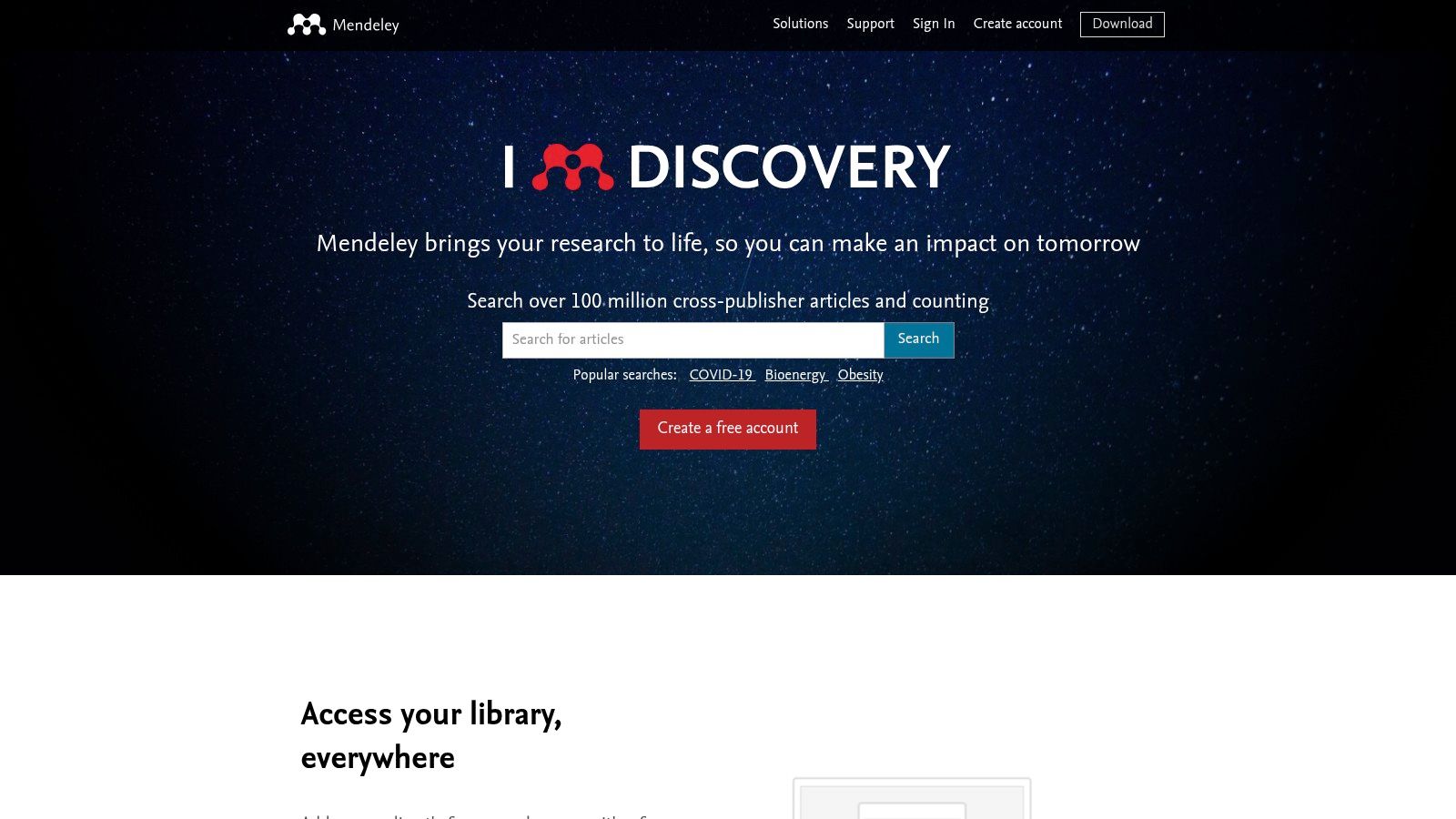
While Mendeley might not be ideal for general document management needs like those of a real estate agency processing property documents or a transportation company collecting driver documents, its specialized features make it invaluable for researchers. Imagine a legal firm specializing in intellectual property needing to manage a large collection of research papers related to patent law. Mendeley’s robust search and organizational features, combined with its ability to generate citations automatically, would significantly improve their workflow. Similarly, portfolio managers in research-intensive fields could leverage Mendeley to stay up-to-date with the latest publications and organize their research supporting investment decisions.
Key features include automatic metadata extraction from research papers (saving researchers valuable time), a built-in PDF reader with annotation capabilities for in-depth analysis, and citation generator and bibliography creation tools that ensure accuracy and consistency. Mendeley also offers collaborative groups for sharing research and a research paper recommendation engine for discovering new and relevant publications. You can learn more about Mendeley and its specific applications.
Mendeley offers a free basic version with generous storage, making it accessible to a wide range of users. It also boasts excellent integration with academic databases and search engines, allowing researchers to seamlessly import and manage their findings. Strong community features further enhance its value by fostering researcher networking and collaboration. Cross-platform availability with cloud synchronization ensures access to your research library from anywhere.
Pros:
- Free basic version with generous storage
- Excellent integration with academic databases and search engines
- Strong community features for researcher networking
- Cross-platform availability with cloud synchronization
Cons:
- Primarily focused on academic research rather than general document management
- Occasional issues with metadata extraction accuracy
- Limited customization options for organization compared to general document management systems
Website: https://www.mendeley.com/
Mendeley deserves its place on this list because it addresses the specific needs of researchers and academics in a way that general document collection software often can’t. Its targeted features and focus on scholarly work make it a powerful tool for managing, organizing, and discovering research materials. While not designed for general business document management, its value is undeniable for those operating in research-heavy environments.
7. Dropbox Business
Dropbox Business is a robust document collection software solution ideal for streamlining workflows and enhancing collaboration. It offers a centralized platform for teams to securely collect, organize, and share documents, making it a valuable asset for various business needs, from simple file sharing to complex project management. Its intuitive interface and powerful features make it an excellent choice for businesses of all sizes looking to improve document management.
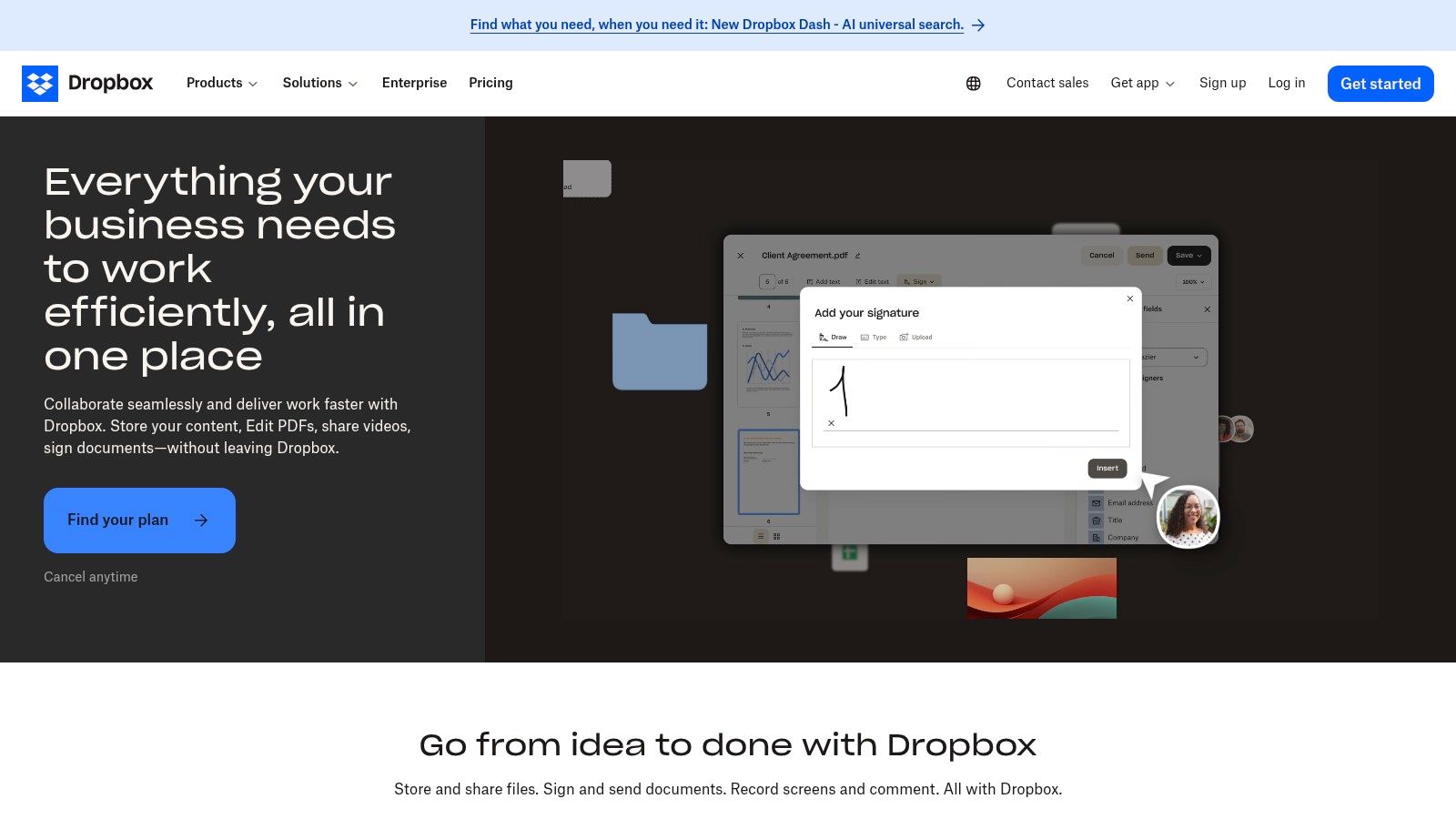
For example, a legal firm can utilize Dropbox Business to securely manage client documents, ensuring compliance and easy access for authorized personnel. HR departments can streamline onboarding processes by collecting and organizing candidate documents within shared folders with designated permissions. Real estate agencies can efficiently process property documents and tenant applications, while mortgage brokers can automate loan paperwork, significantly reducing processing time. Even transportation companies can leverage Dropbox Business for collecting driver and vehicle documentation, enhancing operational efficiency. Its versatility extends to immigration firms managing visa applications and portfolio managers sharing crucial financial documents.
Dropbox Business offers several key features that make it a strong contender in the document collection software landscape: centralized team workspaces with smart folder organization, file recovery and version history, Dropbox Paper for collaborative document creation, advanced sharing controls and link permissions, and Smart Sync for accessing cloud files without consuming local storage. This last feature is particularly useful for individuals working with large files or those with limited hard drive space.
Pros:
- Intuitive User Interface: Requires minimal training, allowing teams to quickly adopt and utilize the platform effectively.
- Excellent Synchronization Speed and Reliability: Ensures seamless access to files across multiple devices.
- Strong Mobile Apps: Provides convenient document access and editing on the go.
- Wide Range of Integrations: Connects with popular productivity tools, enhancing workflow efficiency.
Cons:
- Less Advanced Document Management Features: Compared to specialized platforms, Dropbox Business may lack granular metadata and tagging capabilities.
- Storage Costs: Can become expensive for large teams requiring substantial storage capacity.
- Limited Metadata and Tagging: May pose challenges for businesses needing advanced document indexing and retrieval.
Pricing: Dropbox Business offers various pricing plans based on storage needs and team size. Details are available on their website.
Technical Requirements: Dropbox Business is compatible with various operating systems and devices. Specific requirements can be found on their website.
Implementation/Setup Tips:
- Establish a Clear Folder Structure: Organize team folders logically to facilitate easy navigation and document retrieval.
- Utilize Permission Controls: Ensure appropriate access levels for different team members to maintain data security.
- Integrate with Existing Tools: Connect Dropbox Business with other productivity applications to streamline workflows.
Comparison with Similar Tools: While similar to other cloud storage solutions like Google Drive or Microsoft OneDrive, Dropbox Business distinguishes itself with its robust collaboration features, user-friendly interface, and focus on security.
Why Dropbox Business Deserves its Place on this List: Dropbox Business stands out as a versatile and accessible document collection software solution. Its user-friendly design combined with robust features, including team collaboration tools and secure sharing options, makes it a powerful tool for businesses of all sizes. While it might not offer the hyper-specific functionalities of some enterprise-level document management systems, its ease of use and affordability make it an excellent choice for organizations seeking an efficient and practical solution for document collection and collaboration. Visit Dropbox Business
8. DocuWare
DocuWare is a robust document collection software solution that goes beyond simple storage, offering comprehensive document management and workflow automation. It’s designed to help businesses of all sizes, but its strength lies in handling high volumes of documents and complex workflows. This makes it particularly suitable for industries with stringent compliance requirements, such as healthcare and finance, or businesses dealing with a large number of paper-based processes that need digitizing. Think of it as a central hub for all your documents, streamlining everything from initial collection and indexing to archiving and retrieval.
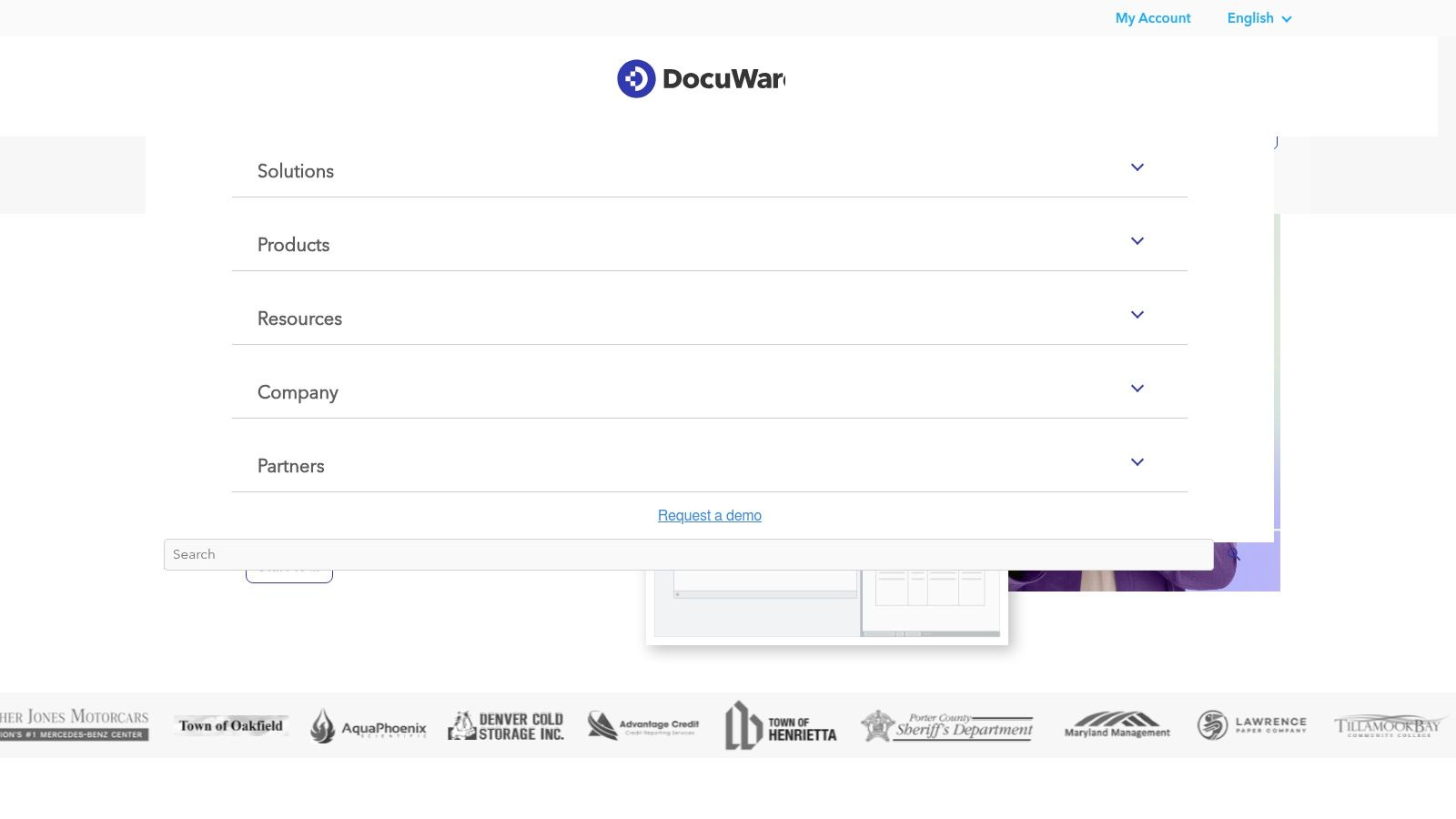
DocuWare earns its place on this list thanks to its powerful automation features and comprehensive approach to document lifecycle management. Its Intelligent Indexing technology automatically classifies documents, minimizing manual data entry and ensuring consistency. This is a huge time-saver and reduces the risk of human error, especially beneficial for organizations dealing with large volumes of paperwork like legal firms, HR departments, or mortgage brokers.
Key Features and Benefits:
- Intelligent Indexing: Automatically classifies and indexes incoming documents, reducing manual labor and improving accuracy.
- Workflow Automation: Digitizes and automates document-centric business processes, from simple approvals to complex multi-step workflows. This is ideal for processes like onboarding new employees, processing loan applications, or managing client files.
- Powerful Search: Enables quick and accurate retrieval of documents based on keywords, metadata, or full-text search. This is crucial for legal firms, real estate agencies, and other businesses needing rapid access to specific documents.
- Secure Storage: Provides secure document storage and access control, ensuring compliance with regulations like GDPR, HIPAA, and others. This is essential for healthcare providers, financial institutions, and any organization handling sensitive data.
- Mobile Access: Allows employees to access the document repository from anywhere, anytime, increasing productivity and flexibility. Particularly useful for transportation companies managing driver documents or field service technicians needing access to manuals and instructions.
Pros:
- Comprehensive document lifecycle management, from capture to archiving.
- Strong regulatory compliance features.
- Flexible deployment options (cloud or on-premises).
- Excellent for automating document-centric business processes.
Cons:
- Higher implementation complexity requiring professional services.
- Steeper learning curve for administrators.
- Generally higher total cost of ownership compared to simpler solutions.
- May have more features than needed for very small organizations.
Pricing and Technical Requirements:
DocuWare’s pricing is typically subscription-based and varies depending on the number of users, storage capacity, and features required. Contact DocuWare directly for specific pricing information. Technical requirements vary based on deployment method (cloud or on-premises). Their cloud solution requires minimal setup, while on-premises deployments have more specific server and software requirements.
Implementation Tips:
- Clearly define your document management needs and workflows before implementation.
- Leverage DocuWare’s professional services for assistance with setup and configuration.
- Provide thorough training to administrators and end-users to maximize adoption and efficiency.
Comparison with Similar Tools:
While solutions like M-Files and Laserfiche offer similar functionalities, DocuWare stands out with its focus on intelligent automation and robust compliance features. It is a better fit for organizations with complex workflows and high document volumes, whereas simpler solutions might suffice for smaller businesses with basic document collection needs.
Website: https://start.docuware.com/
DocuWare is a powerful document collection software solution that excels in automating complex workflows and ensuring regulatory compliance. While it may be more complex and expensive than some simpler options, its advanced features and robust capabilities make it a worthwhile investment for organizations needing to efficiently manage high volumes of documents and streamline their document-centric processes.
Document Collection Tools Feature Comparison
| Solution | Core Features & Automation | User Experience & Quality ★ | Unique Selling Points ✨ | Target Audience 👥 | Pricing & Value 💰 |
|---|---|---|---|---|---|
| 🏆 Superdocu | Workflow builder, pre-built templates, branded portals, automated reminders, validation dashboard, integrations with 3,000+ apps | Intuitive UI, seamless automation ★★★★☆ | Industry-specific templates, GDPR + EU hosting, Zapier + DocuSign integration ✨ | SMBs & specialized industries (legal, real estate, HR, etc.) 👥 | Tiered plans, free trial, custom Enterprise 💰💰 |
| Adobe Acrobat Pro DC | PDF creation/editing, OCR, eSignatures, cloud integration | Industry-standard PDF tool ★★★★☆ | Powerful PDF editing, Adobe ecosystem integration | Professionals needing robust PDF management 👥 | Higher price, subscription model 💰💰💰 |
| Microsoft SharePoint | Document repository, version control, workflow automation | Enterprise-grade, customizable ★★★★☆ | Deep MS Office integration, enterprise scalability | Large enterprises, MS ecosystem users 👥 | Higher cost for advanced features 💰💰💰 |
| Evernote Business | Cross-platform notes, web clipper, OCR, collaboration | Easy to use, powerful search ★★★☆☆ | Great for diverse info capture, offline access | Small to medium teams needing note/document capture 👥 | Moderate; storage limits on lower plans 💰💰 |
| Box | Secure cloud storage, version history, workflows, metadata | User-friendly, scalable ★★★★☆ | Strong security/compliance, 1,500+ app integrations | SMBs to enterprises seeking secure content management 👥 | Higher pricing for advanced features 💰💰💰 |
| Mendeley | Reference management, PDF annotation, citation generation | Academic-focused, researcher tools ★★★☆☆ | Research networking, academic database integration | Researchers and academics 👥 | Free basic, premium paid tiers 💰 |
| Dropbox Business | Team folders, version history, Dropbox Paper, smart sync | Intuitive, reliable sync ★★★☆☆ | Strong mobile apps, broad productivity tool integration | Teams needing simple file sharing & collaboration 👥 | Moderate cost, can be pricey at scale 💰💰 |
| DocuWare | Intelligent indexing, workflow automation, secure storage | Powerful but complex ★★★☆☆ | Comprehensive lifecycle management, cloud/on-premise | Mid to large organizations with complex workflows 👥 | Higher total cost, professional implementation 💰💰💰 |
Choosing the Right Document Collection Software
Selecting the right document collection software can significantly impact your business’s efficiency and productivity. We’ve explored a range of options, from versatile tools like Adobe Acrobat Pro DC and Dropbox Business, to specialized solutions like Mendeley for research and DocuWare for enterprise-level document management. Remember that the best document collection software for you depends on your specific needs. Small businesses might find Evernote Business or Box sufficient, while larger organizations or those with specific compliance needs, like legal firms or mortgage brokers, could benefit from SharePoint or dedicated solutions. Key factors to consider include ease of use, integration capabilities, security features, scalability, and of course, budget.
When implementing your chosen document collection software, prioritize user training and establish clear document management procedures. This will ensure a smooth transition and maximize the benefits of your new system. By carefully evaluating your requirements and exploring the available options, you can transform your document workflows and unlock new levels of organization and efficiency.
Streamline your document collection processes and experience the power of automated workflows. Start your free trial with Superdocu, a powerful document collection software designed to simplify and secure your document management, and see how it can transform your business. Visit Superdocu today!
